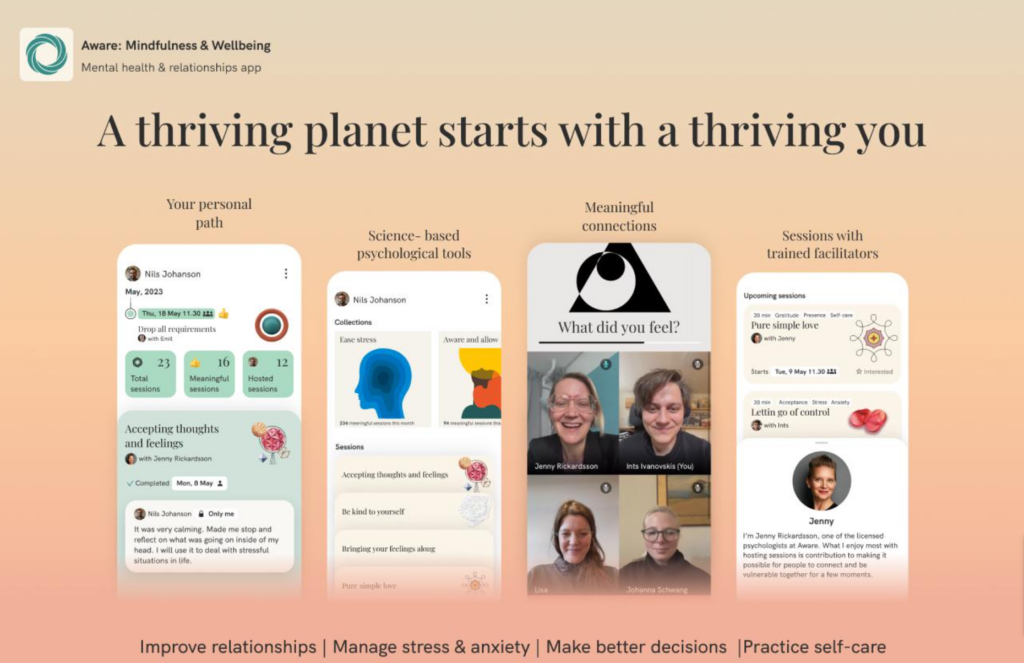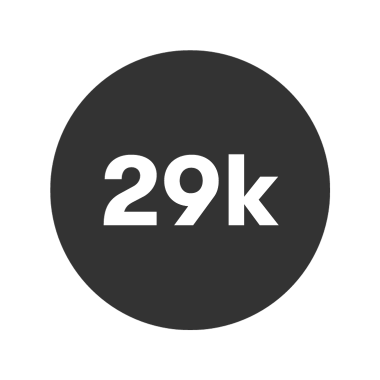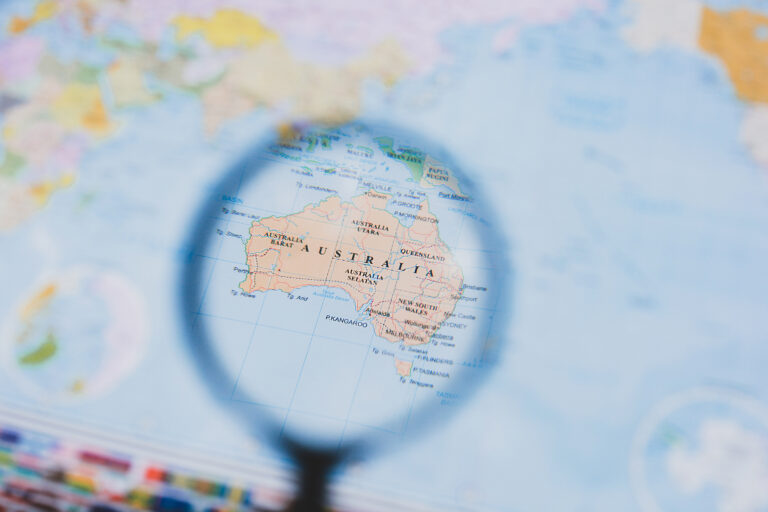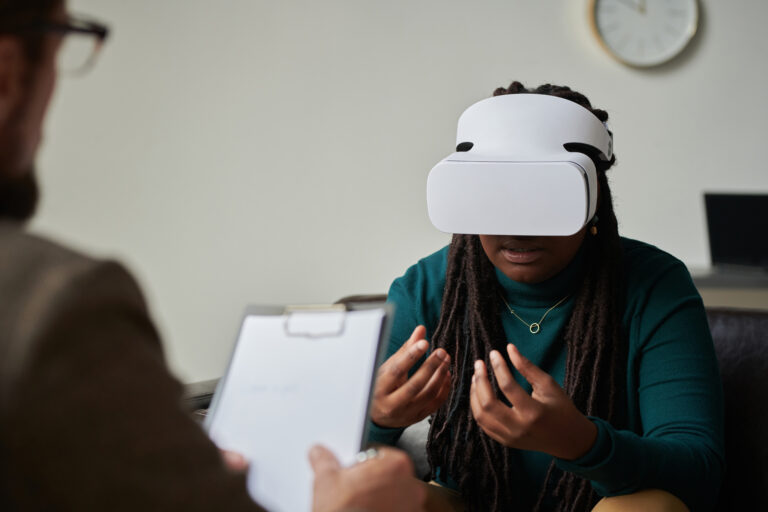The foundation 29k is a non-profit initiative to scale a mental health platform with the aim to help change 10 million people’s lives for the better by 2030, for free! And in that process also contribute to creating a more sustainable world. Here we share our journey so far. What we have found to work well and challenges. We are also inviting you to use what we already have built, and to come and co-create this with us in an open-source approach.
We humans are creating the global problems – we can also be the solution.
Polarization, climate change, conflict and mental ill-health are on the rise. Uncertainty and hopelessness is spreading around the globe. All these things have one thing in common: human behavior.
Luckily, human behaviors are under our direct control to change.
In recent years there has been a growing increase of research pointing to the connection between global sustainability and growing our inner capacities to deal with our increasingly complex environment and challenges [1]. This has been recognised by e.g. the 2022 Assessment Reports of the Intergovernmental Panel on Climate Change [2] and the latest UNDP report “Human development report 2021/2022” that summons up the last report by stating:
“The central message of this year’s Report is straightforward: to turn new uncertainties from a threat to an opportunity, we must double down on human development to unleash our creative and cooperative capacities.”
Fortunately, research shows that the inner abilities (or psychological skills) for creating sustainability overlaps to large degrees with the abilities and skills needed for human thriving and mental health – and they can be trained.
Communities of practice have emerged around the topic of human inner dimensions to accelerate sustainability-related work and human thriving. One of those communities has been co-initiated by the non-profit, 29k, and has also started to map out a framework that describes more in detail what abilities/psychological skills to train that and is called “the Inner Development Goals”.
29k, a non-profit, co-created, digital platform for mental health and sustainability
Who we are
The 29k Foundation was founded in 2016. We are an open-source, co-created, non-profit foundation that makes psychological tools for mental health, inner development, and civic leadership accessible for free. By gathering contributors and co-creators we aim to build a platform to change 10 million people’s lives by 2030.
29k stands for 29 000 days, which is roughly 80 years, and this is the amount of days we get on average in the western world on this planet. How can we make those days count?
Why do we do it?
For the greater good. We believe there is a need to strengthen people and people’s ability to create healthy environments around themselves, for others and the planet.
We think that’s probably one of the most important things to do globally today and we believe that it’s through inner sustainability and inner growth that we can navigate and build a more sustainable society in harmony with the planet we inhabit.

What we have built so far (successes and learnings)
We soft-launched the first version of the platform (accessed via the “29k” app) in 2020.
The last three years we’ve spent fine-tuning this open source, non-profit platform for mental well-being, inner development and social support.
So far we have reached 400,000+ downloads, a 4.8 score from 4500 ratings and users from 200+ countries. Dedicated users love our combination of science-based psychological tools, easy to use format, social support and free access.
The magic ingredients we have found works well
In short, what we are optimizing for are a combination of those three ingredients: (1) a lovable experience where you practice (2) research based interventions over time in an environment that is (3) rich with human connection.
Before diving into those three magic ingredients above, it might be worth mentioning a couple more ingredients we believe are core in this initiative.
Non-profit – since we are a non-profit foundation, we are always able to let the users’ interests come first. We cannot, and do not sell data or use data to optimize for profit (this is protected in the statutes of the foundation). This means that we can adhere strictly to “privacy by design” (e.g. only collect data that can give the user a better experience) and GDPR regulations (e.g. privacy for users in the sense that data is stored on the users device, no need for login etc.). There is also no return of investments (monetary) to take into account. Everything that is invested in the platform goes directly to building out and maintaining the platform.
Scalability at our core – the solutions and functionality we create on the platform/in the app needs to be able to be used by millions of users simultaneously. And we are aiming at a cost close to zero per user that has been helped (we currently have a marginal cost of €15 per impacted life versus a cost of €750-900 for equivalent solutions available on the market).
And now back to those three magic ingredients…
A lovable experience
There are a lot of digital interventions that have been found effective via research. Unfortunately, very few of those interventions manage to get out of academia and reach the broader public. Some of the reasons for this are probably that it is often difficult and expensive to create digital solutions and spread the interventions with broad reach. Another reason might be that there are seldom clear incentives for researchers to make interventions available once the scientific papers have been published. A large number of effective interventions that reach the broader public are not super-lovable-experiences, but sometimes more resemble text-documents online.
Therefore we are putting a lot of love and effort into producing short, bit-sized texts, and have our designers and UX/UI researchers create as much beauty and user-friendliness as possible. A key here has been to work closely and interdisciplinary (e.g. psychologists and researchers with good writing skills together with the rest of the tech and design team).
Research based interventions, co-creation – an example
Everything that goes into the 29k platform needs to have backing in research. We have loads of courses, single sessions, and mindfulness exercises in the apps. All of them comes from a trusted source in the sense that we use interventions that a) has been proven to work earlier, b) there is scientific proof the process of change is known so we can optimize for that process (e.g. exposure), and c) we always aim to collaborate with the most knowledgeable researchers in the field. Let’s take our 7-lesson course “Self-Compassion” as an example. Here are the broad strokes about how we co-created it:
- We contacted Drs Kristin Neff and Chris Germer who are among the most knowledgeable researchers in the field of self-compassion. We asked if they wanted to co-create a course for us that would be given away for free. They agreed to help us out.
- Together we created a rough draft for 7 lessons. Our in-house psychologists wrote the sessions. We user-tested it many times.
- We filmed Rachel Brathen when she went through the course as a user. Rachel is a very well-known YogaTeacher with millions of digital followers. In this case she is not filmed as a teacher, but rather just a human being going through the course, being vulnerable. This models to the users both how the exercise works, and also gets the user in contact with his/her emotions.
- Drs Kristin Neff and Chris Germer got to peer-review the course and approve it before we launched it into the app.
One of the campaigns we have done for the Self-compassion course is a short film called “Mirrors”. Together with the film-director Paul Jerndal we collaborated with three famous Swedish actors and artists (Cecilia von der Esch, Danny Saucedo, and Anis don Demina) and made a short-movie (3 minutes). We use exercises from the first lesson in the self-compassion course and let the actors voice their inner, most critical voices in the mirror, and later their inner, kind voices.
In June 2023 this short film “Mirrors” won a big prize at the WHO’s international film festival Health for All Film Festival. 800 filmmakers from 106 countries had submitted films.
You can watch the three minute long film here. It’s in Swedish, but you use the CC button for subtitles
An environment that is rich with human connection to help users practice over time.
We know that a huge challenge with digital interventions is to help clients and those that want to work with the interventions to actually do the work. This is one reason why internet-based cognitive behavioral therapy (iCBT) often needs therapeutic support, that a human introduces the program, and follows up homework and progress regularly. A flip-side with having to provide therapeutic support is that it becomes difficult to scale it to many. Don’t get us wrong, therapeutic support is great. Especially for clients that have more severe problems. However, what we also are super-eager to explore is…
“how can we create a digital format, that is rich with human connection, that gives a deep, lovable experience that makes you want to come back and practice over time?”
We are working hard on making the users come into an environment that is rich with human connection. And still make it into a safe environment where the user decides for his-, herself how much he or she wants to interact with others. For some it is enough to read others reflections on what an exercise awakened in them, and being able to share his- or her own reflections anonymously or publicly. It is possible to go through courses and exercises by oneself. It is also possible to do exercises and courses in the app in group-session format, together with friends, or together with anyone by using the in-built video-sharing functions that we have built in the app.
… and, we have seen that magic happens within the video-sharing-groups. We can see that if a user has completed ONE video-sharing in the app:
~ 75% of users in sharings stick around for more than two months
~ 55% of users in sharings are still around five months later
Here is a short video (one minute) with short clips from video-sharing groups from the app. (clips are from the first groups in the app and shared with permission).
The challenge
We are proud of the fact that 75% of the users that have completed ONE video-sharing in the app stick around for more than two months with “only” peer-to-peer support! However, of our +400 000 downloads only about 7% get into video-sharing. It seems like the threshold to get into video-sharing has been a bit too scary. Therefore we have built a new app, it’s our 2.0 version and we call it “Aware”.
Proudly presenting the second iteration of our 29k app, version 2.0: “Aware”
The past year we have been iterating on a new version of the app. We call it “Aware” and soft launched it in May 2023 to start user testing the new format.
The Aware app is a totally new app. We have harvested the learnings from the first platform, the “29k” app, and massively improved several aspects of it. Some of the things we are especially proud of includes 1) Easier to do exercises with others, 2) Privacy by design and 3) Completely open-source content and source code that makes it much easier to come and co-create with us and/or use the platform for independent research and projects. Let’s have a quick look at these three.
1) Easier to do exercises with others
Since we know that magic happens when our users do exercises together with others, we have significantly lowered the threshold when it comes to doing exercises together with others and get that healthy dose of human connection.
Anyone can still do courses and exercises alone and read reflections from others and share their own reflections anonymously or publicly. We have also made the whole journey of doing exercises together with others much less demanding. A key here is trust and step-by-step at one’s own pace. One example could look like this
- A mental health volunteer or staff (e.g at UNICEF or a student counselor at university) decides to give the course “Deal with stress” via the app “Aware”, then that person offers an open group to his/her clientele or specifically invites a group. Groups can range between 3-200 participants. Invites can be sent from within the app via mail, text, and other ways.
- The person that gets invited most probably trusts the institution or the person and is more likely to join.
- Each session in a course that is hosted by a person follows the same format, namely:
- Experience starts (beautiful artwork serves as a portal to prepare for into the session)
- The host welcomes. The host has a script to follow on his/her screen. Users can choose to have video on or start with video off.
- The host leads an exercise. Exercises are often pre-recorded and the host just presses play.
- Users get some time to reflect what this awakened in them and write it down.
- The host invites a few of the participants to (optionally) share their reflections. Before the sharing the host reads a few ground-rules. The persons that listen are not to ask questions, “fix” or give advice. The instruction is to just hold space for the person sharing his/her reflections.
- When sharings are done, participants are offered to share a couple of words (optionally) what state they are leaving the experience in.
- The host summarizes key learnings from the exercise, thanks and closes the experience.
In this way the participants can be as vulnerable and active as they, themselves choose to be. And even if they do not share their reflections with the group, they can hear others share. This usually both gives the relief “I’m not alone”, recognition and new perspectives. And gives a meaningful experience that makes users want to come back and practice over time, since human connection makes the experience meaningful.
2) Privacy by design
In the “Aware” app we have put a lot of effort into adhering to “privacy by design” and GDPR. There are no login or registration requirements to use the app. Our users own their data and sensitive data is only stored on the user’s device. The possibility to be completely anonymous in Aware is fundamental, so users also have complete control of what is shared with others and can at any time delete all their data.
Lastly, by being open-source we’re transparent to anyone who wants to understand or challenge us in how the data is treated.
3) Completely open-source content and source code that makes it much easier to come and co-create with us.
We are inspired by open source standards such as Wikipedia and Linux. We want to gather actors to come together and co-create a really good platform that can help towards both human thriving and global sustainability.
Therefore we have implemented an open CMS (Content Management System) that makes it possible for e.g other researchers to write exercises and courses directly into the app (with quality vetting of content and design from the 29k team before release). Volunteers or partners can also do translations of existing content into their local languages directly in the app. For more insights into ways to contribute, check out our Community Contribution Central.
Since we believe open source standards (e.g such as Wikipedia and Linux) and co-creation are vital ingredients in building this together, we are inviting partners to come and join us building this together.
Philanthropic funding took the risk and supported the development of the 29k platform and platforms “29k” and “Aware.” Now this foundation can be used for further development, together.
Partners we already are collaborating with and want more of includes (but not limited to):
- Governments / Institutions
- Civil Society Organizations
- Researchers
- Education providers (schools, universities)
- Corporates / Other orgs. for their customers or members (e.g. unions, hotel chains)
- Health care providers incl.
- Insurers
- Movements / Communities
And there are many ways to jack-in with us. Three overarching ways include:
- Initiating projects in collaboration with the small core team at 29k Aware. This could include making the platform available in a new language, opening a new user segment together or adding new content.
- Create separate, self-supported projects that are run on the platform. This includes contributing financially with a platform fee that contributes to the maintenance and continued development and running of the platform that is already existing and being iterated on.
- Direct support to the core team at 29k Aware to keep developing the platform and improving the user experience.
For more ways to co-create with us (e.g hosting sessions, contribute code, art, donations, translations and more) visit our Community contribution central
And you can always reach out to us directly at hello@29k.org
To download and try our new, 2.0 app version “Aware”
click here or use qr-code: https://aware.29k.org/download
To download and try our first versions of the app “29k”
click here or use qr-code: https://app.29k.org/download
References
1. Ives, C. D., Schäpke, N., Woiwode, C., & Wamsler, C. (2023). IMAGINE sustainability: integrated inner-outer transformation in research, education and practice. Sustainability Science, 1-10.
2. IPCC (2022) Climate change,impacts, adaptation, and vulnerability. Contribution of Working Group II to the Sixth Assessment Report of the Intergovernmental Panel on Climate Change. Cambridge University Press, Cambridge, and New York, p 3056, https:// doi. org/ 10. 1017/ 97810 09325 844





